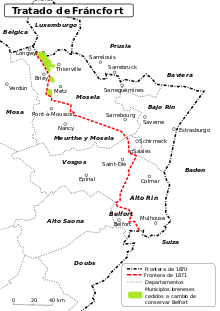Treaty of Frankfurt
The Treaty of Frankfurt (French: Le traité de Frankfurt; German: Friede von Frankfurt) was a peace treaty signed on May 10, 1871 in Frankfurt am Main between the German Empire and France, at the end of the Franco-Prussian War. It ratified the Treaty of Versailles of February 26, 1871, agreed between Otto von Bismarck and the French head of government, Adolphe Thiers.
The German Empire that emerged from the conflict came to include 540,000 km² including the Imperial Territory of Alsace and Lorraine. However, both regions were returned to France under the 1919 Treaty of Versailles.
History
The preliminaries of the Treaty of Frankfurt between Otto von Bismarck and Adolphe Thiers were signed in Versailles on February 26, 1871, being accepted by the National Assembly, in Bordeaux, from the following March 1, in order to avoid an “entrée triomphale” (triumphal entry) of German troops in Paris, the capital of France. Negotiations were resumed from March 28 to April 24, 1871 in Brussels, Belgium, and continued in Frankfurt am Main by French Foreign Minister Jules Favre and French Finance Minister Augustin Pouyer-Quertier (6- May 10).
The peace treaty signed on May 10, 1871, confirmed the preliminaries: cession to Germany of Alsace and the northeast of the Lorraine plateau, including the Moselle valley, but excluding Briey and the Belfort district (radius of 10 km around the city).
Summary
The treaty:
- He confirmed the border between the French Republic and the German Empire, assuming the assignment to Germany of the French departments that made up Alsace, northern Lorraine and part of the Vosges.
- He gave the option to residents of the Alsace-Lorena region until 1 October 1872 to decide between preserving their French nationality and emigrating, or staying in the region and becoming German citizens (' s fake fake fake fake fake brainchild exposes0150740. exposes himself to death penalty0150 740 chose France.
- He pointed out the points to follow for the withdrawal of German troops from certain areas (France allowed the German army to parade through Paris).
- It returned the payment of the war compensation to be paid by France of 5 billion francs (paid in three years).
- He recognized the acceptance of William I of Prussia as German emperor.
- He demanded the German military occupation of a part of the territory of France until the compensation was paid (to the surprise of Germany, the French quickly paid the compensation). The German army occupied part of the French territory until 1873.
The treaty also clarified the following points:
- The use of the waterways with respect to Alsace-Lorraine.
- Trade between the two countries.
- The exchange of prisoners of war.
Factors that influenced territorial boundaries
Strategy
The German military intervened in favor of control of the Alsace region, the northern Vosges (the mountain range) and the area between Thionville (Diedenhofen) and Metz as a requirement for the protection of Germany. Mainly, the German military considered control of the road between Thonville and Metz as the most important area of control in the event of a new war with France.
Politics
Without a change in territorial boundaries to the west, the new empire's borders with France would have been largely divided between the states of Baden and Bavaria, whose governments were lukewarm about the prospect of having a vengeful France in their hands. doors. It would also have necessitated the stationing of substantial Imperial forces on the borders of those states, possibly compromising their ability to exercise the considerable autonomy that the southern states had managed to maintain in the unification treaty. A change in the border alleviated those problems. The southern German states, which had refused to join the North German Confederation in 1867, accepted the creation of a unified Germany and the tutelage of the Prussian King Wilhelm I.
Economy
Natural resources in Alsace-Lorraine (iron ore and coal) did not appear to play a role in Germany's struggle for the annexed areas. Military annexation was the main stated objective along with the unification of the German people. At the same time, France lost 1,447,000 hectares, 1,694 villages and &&&&&&&&01597000.&&&& &01,597,000 inhabitants, as well as 20% of its potential in mining and steel. The 1862 trade treaty with Prussia was not renewed but France granted Germany, for trade and navigation, a most-favoured-country clause. France would respect the clauses of the Frankfurt Treaty in their entirety until 1914.
This treaty polarized French policy toward Germany for the next forty years. The reconquest of Alsace-Lorraine, the "lost provinces", became an obsession characterized by a revenge that would be one of the strongest reasons for France's participation in World War I.
Contenido relacionado
Occupation of Araucanía
Origins
Clarence Melvin Zener

